
Letter from the Chair
Welcome to our 2019 newsletter edition.
This year we are particularly excited that an economics undergraduate student has won the Governor Generals Academic Medal. The Silver Medal is the most prestigious academic achievement award that an undergraduate student at a Canadian university can receive! As well, thanks to the generosity of our alumni donors, we were able to support four graduate students who had their research accepted for presentation at the Canadian Economics Association meetings in Banff. It is most gratifying to see our students academic endeavours acknowledged in these ways.
The department has seen some administrative role changes this spring, but the one change most of our undergraduate alumni will most relate to is the retirement of Mary Ann Vaughan this fall. Mary Ann has been a fixture in the department for many years and has introduced countless (admin speak for I could not be bothered to run the program to find out) students to the questions that make economics so fascinating and relevant for society. As to those administrative changes: the department very much thanks Margaret Insley for her two terms of service as Chair, and all indications are that she is very happy there are term limits around here!
Looking forward, we are once again gearing up for a new academic year, with a new crop of first year students, some from our 2+2 partner universities. Research seminar speakers have been invited and scheduled, and the final preparations for the Distinguished Lecture are in full swing. We hope to see many of you that live in driving distance for this highlight. On the lighter side of life: both humor and puzzles await below as well.
As always, please stay in touch and let us know what was useful -- and more importantly, what could have been useful -- in your studies here!
Lutz-Alexander Busch
Chair, Economics Department
We extend a special invitation to everyone to attend our Distinguished Lecture in Economics, October 28, 4:30 p.m. Arts Lecture Hall, room 113. A reception will follow the lecture in Hagey Hall Room 373 at 6:00 p.m.
Child Health as Human Capital
By Dr. Janet Currie, Henry Putnam Professor of Economics and Policy Affairs and Co-Director of the Center for Health and Wellbeing at Princeton University
Child health is increasingly understood to be a critical form of human capital, but only recently have we begun to understand how valuable it is and how better to support its development. This lecture provides an overview of recent work demonstrating the key role of public insurance in supporting longer-term human capital development, and pointing to improvements in child mental health as an especially important mechanism.
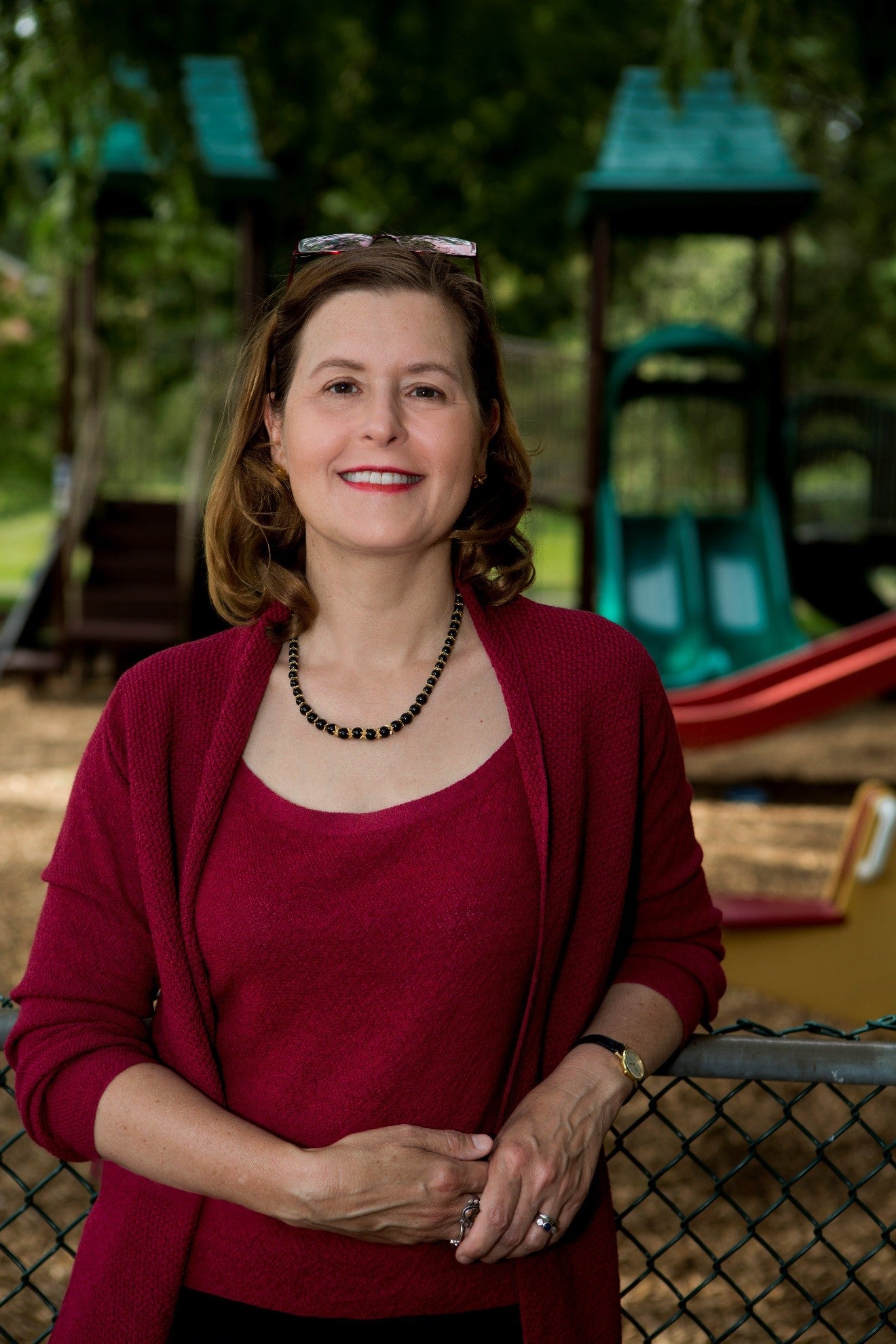
About the distinguished lecturer
Professor Janet Currie is a pioneer in the economic analysis of child development and its role in the development of social inequalities. Her work has been instrumental in demonstrating the long-term impacts of early life childhood intervention programs, health insurance coverage, and pollution exposure.
About the Waterloo Arts Distinguished Lecture in Economics
Thanks to generous gifts from Economics alumni Dominic Y. Leung, Brian Lipskie, Karen J. Henderson and Thomas E. Scott, the Department of Economics annually invites a distinguished scholar to present a lecture on the state of the art in a field of economic research. The Distinguished Lecture gives students from across the academy a special opportunity to enhance their understanding of the social issues and challenges to which economics can contribute. The University community and members of the public are particularly invited to attend this public lecture.
Highlights of the Past Year
Alumni Visits

We’re always excited to welcome a visit from a Waterloo Econ graduate, and we were incredibly grateful to Brian Lipskie and Brian DePratto for taking time out to spend with us. Brian Lipskie, president of The RaeLipskie Partnership in Waterloo, spoke to fourth year honours essay students about the importance of finding your path through a principled approach and trying new things. It’s inspiring to hear how integrity and self-belief can be the foundation of a career of using your economics training to benefit people and society. Thank you, Brian, for generating a thoughtful learning experience for our students, who graduated in 2019!
Brian Lipskie, CFA; BA '85, Economics
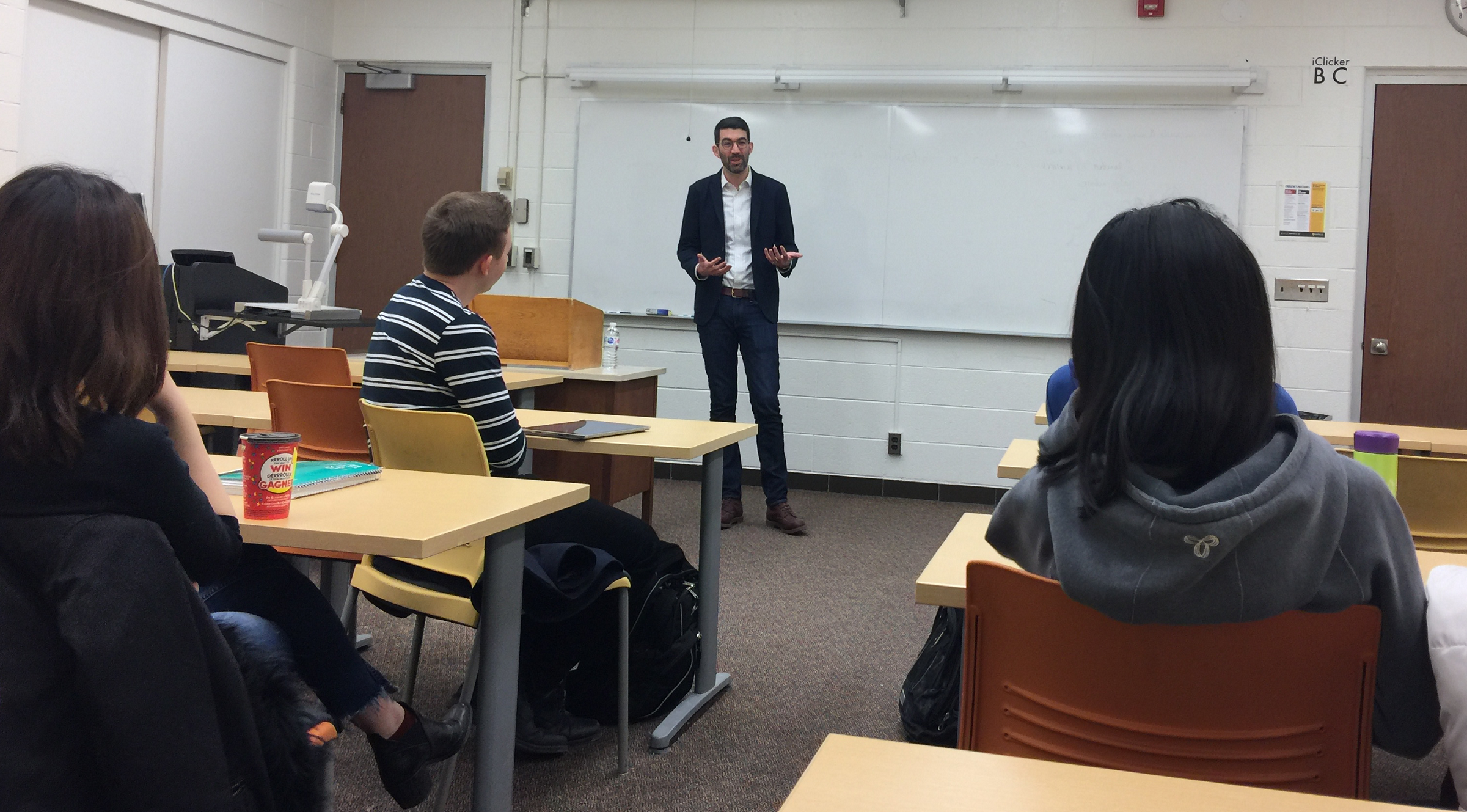
Brian DePratto, a senior economist with TD Bank, was a guest speaker in a graduate class on environmental economics (Econ 657) in March 2019. He spoke about his personal experience in the job market and his career transition from the public to the private sector. Thank you, sincerely, for visiting us, Brian -- our students appreciated very much your advice on navigating the job market.
Brian DePratto, BA '07 Economics, speaking to students. (A-D. Nimubona, photo)
Public Policy Datafest
With the help of the Royal Bank of Canada and Innovation, Science and Economic Development Canada, Dr. Anindya Sen hosted the first ever multidisciplinary public policy datafest at a Canadian university in March this year. Fourteen teams of four graduate students each from across the Arts programs receive a pressing question related to Canadian social, economic and environmental conditions, and are given just 48 hours to prepare intelligent responses using data analysis and multidisciplinary critical thinking. And this year, one of the three teams from Economics won third place – congratulations!
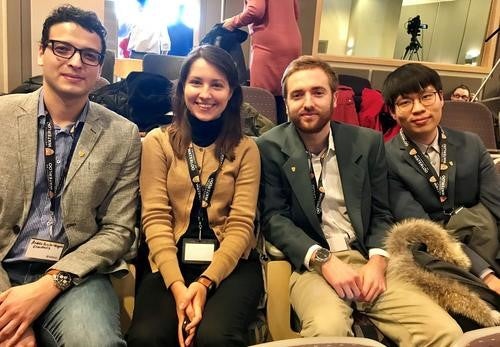
Economics PhD student team of Andres Arcila Vasquez, Iuliia Nesterova, John Baker, and Zehua Pan that placed third in the inaugaral Policy Datafest
Bank of Canada Governor's Challenge 2018
Congratulations to our Economics undergraduate team who participated in the Bank of Canada’s Governor’s Challenge. In November 2018, the team presented their recommendations for Canadian monetary policy to a panel of judges. Once again, the team coached by Professor Jean Paul Lam did a great job. We are truly proud of them!

Team members, L-R: Austin Coles, Alexander Colenutt, Tijil Dewan, Kamilah Ebrahim, Sin Yeung, and Isil Dogan.
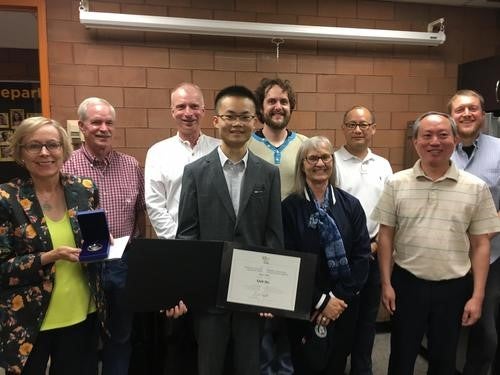
Qidi Hu won the Governor General’s Silver Medal, for the highest academic average on campus.
We’re so proud of our undergraduate Qidi Hu for winning the Governor General’s Silver Medal. The award has been given since 1873, and is “one of the most prestigious awards that a student in a Canadian educational institution can receive.” The news article is available to read here.
Economics Graduate Mandy Tao Receives the 2018 Arts Young Alumni Award
The Arts Young Alumni Award recognizes alumni who have made outstanding contributions in their professional field, in the community, and in public service within 10 years of graduation. This year, the recipient of this award is Mandy Tao, a graduate of the UW Economics program (2010). Read more about this Economics Alumna's journey.
Distinguished Lecture in Economics, September 2018
Last September, Professor David Card (Professor of Economics at the University of California, Berkeley, and Director of the Center for Labor Economics at Berkeley) discussed the importance of firms’ pay and hiring policies for understanding wage inequality, the gender pay gap, the career profile of wages, and many other phenomena. If you missed Dr. Card’s excellent lecture, you can watch it here.
Recent Initiatives
Greening the Economics Department
In our popular environmental economics classes, students learn how economic incentives can reduce pollution. A revenue-neutral carbon tax, for example, can change the relative price of producing greenhouse gasses without the income effect of a typical tax, reducing pollution as it lowers other taxes to keep government revenue the same. This year, the department has joined the cross-campus initiative to be more mindful of green ways to operate, and taken steps to put theory into practice.
Some actions involve simple mindfulness, such as choosing lower packaging options for things we consume. Others involve leadership to modify systems and design new practices that make sense. In our department, Lynn Skelly has led the collective action to a greener path by identifying and implementing departmental practices that are congruent with a more environmentally responsible campus. Solid waste recycling has been extended from batteries and electronics to complex plastics and even whiteboard markers. Many garbage cans on campus now only accept compostable and organic materials. A recent transportation survey of the UW community has opened up the conversation about one of the most significant ways to lower our carbon footprint.
An unsung hero in this green campus culture is our Arts Computing Office, who proactively provides us with technology solutions that reduce carbon emissions. For anyone who has to get into a car to come to campus, being able to securely download a forgotten file is both green and convenient. With everyone thinking about how to align economic theory with environmentally-friendly practice, our beautiful campus is becoming a greener place to work and learn.
Workplace Climate Survey Initiative
This year the department has partnered with the UWaterloo HeForShe initiative to support a workplace climate survey. This initiative by the Canadian Women Economists Committee of the Canadian Economics Association mirrors a similar survey by the American Economics Association last year, and we hope all economists will participate.
Catching up with Mary Ann Vaughan
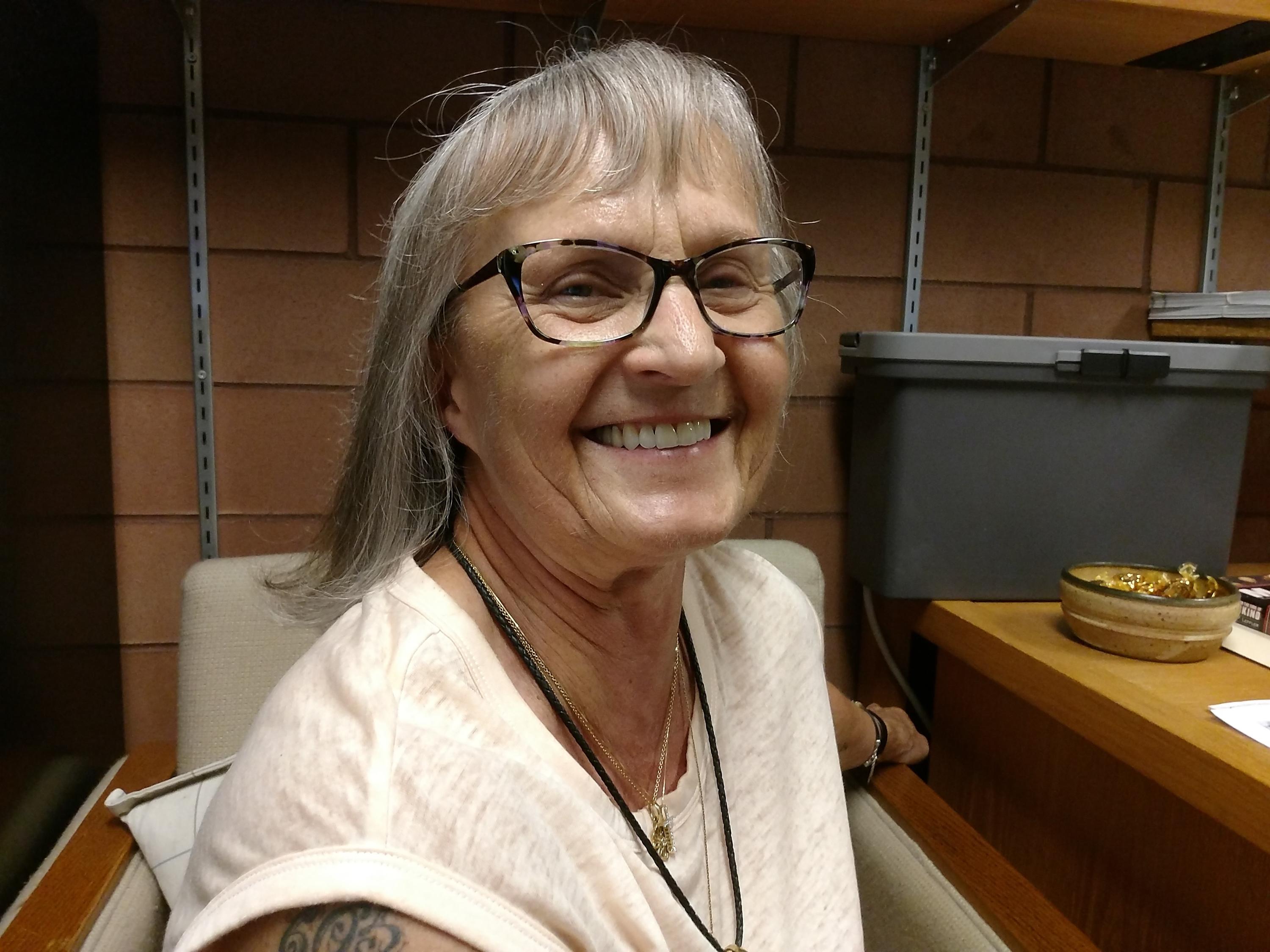
If you graduated in the new millennium, chances are you had Mary Ann Vaughan as your instructor. A gifted teacher, she invited people into the economic way of thinking with her well-organized and easy-to-follow classes. “A good start at university matters,” she told E-CONnect recently. “First year students are fun because they are eager and anxious to be in university.” As Mary Ann retires, she explains how she gave a great start to over 20,000 students over the past 22 academic years.
What made Mary Ann’s classes so memorable was her ability to connect with students “Teaching is very personal,” even in a large introductory class of 250 people. She does this by being present, calm and approachable – but also talking about her own life. “It was a risk” to mix life lessons with economics, “yet so many of my students expressed how much it meant to them, an inroad to their own lives – and they were so supportive. It’s rewarding to know I had the right stuff, to find that I was apparently doing what I was meant to do.“
Providing life lessons that humanize the academy is more than just a privilege that Mary Ann has really enjoyed. It is also valuable to student success. High school may not always prepare people for the level of autonomy and self-direction needed at university. For example, the reliance on gadgets is “not a trend I’m hopeful about.” Students have habituated their devices, yet research clearly shows that people who write do better than people who type. That’s why Mary Ann has a rule about phone use in her class: creating a learning environment for the whole person was the point, and “teaching the material is only part of it.”
Although she’s retiring, Mary Ann has a special place in her heart for the University of Waterloo, particularly her Varsity Warriors. Being a superfan is “part of my personality – it’s in my nature to commit fully” and the calibre of hockey she’s been enjoying for almost a decade now, well there’s no way she’ll be retiring from that!
Lightning Round Questions for Professor Vaughan:
- What’s something about yourself that few people know? “I’m a good friend.”
- Who’s your hero? Dr. David Vaughan, who “ taught me everything about being a good instructor.”
- Favourite book? “Bang the Drum Slowly” by Mark Harris, one of the best sports novels of all time
- Which box of cereal would you want to be? Kashi, because it’s “fitness-nut friendly”
- What’s worse: laundry or dishes? Dishes
- Which is better: cardio or weights? Weights, “no question!”
- Cake or pie? Cake
- Pancakes or waffles? Pancakes
- Bus or train? Train
- Dog or cat? Ummm… I’m not really a pet person!
- Rich friend or loyal friend? Loyal friend, 100%!
- Micro or Macro? Macro
- Best piece of advice for students? Don’t put things off!
- Best piece of advice for the next first year economics instructor? No matter what, never lose control of your classroom – with 250 students to look out for, you are in charge.
Research Highlight: How does a rise in imports affect labour markets and health in Canada?

Professor Lori Curtis has teamed up with Professor Teresa Cyrus, a trade economist at Dalhousie University, to study the effects of trade liberalization on labour force participation, and consequently health and income inequality. Research in the American context has found that rising imports from China are associated with strong measured impacts on labour markets (including falling wages and employment levels), and mental and physical health. Professors Curtis and Cyrus questioned whether the consequences would be the same for Canada.
To examine the issue, the researchers use the Canada Research Data Center Network for Canadian labour, health, and census data covering the period from the late 1990s, before China joined the World Trade Organization in 2001, to 2016, the year of the last Canadian Census. Preliminary results presented at recent conferences indicated that increased imports from China are associated with negative labour market outcomes for Canadians, mirroring the U.S. finding. However, the mental and physical health effects experienced by American workers are not apparent in the Canadian data. Professors Curtis and Cyrus hypothesize that differences in the health effects may be a result of the differences in health-insurance systems in the two countries. Unlike Canada’s public health insurance system, basic health insurance tends to be tied to labour force participation in the U.S. The pair is continuing to explore the reasons for the Canadian health results, as well as any impacts the labour force consequences may have on income inequality. Stay tuned!
Dr. Curtis studies the linkages between health and labour.
Update from the UW Economics Society
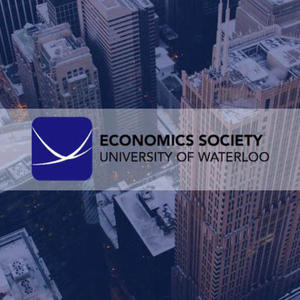
The start of fall term means the UW Economics Society (UWES) will be welcoming many new additions to the team, and we hope you all are as excited as we are!
Our mandate as a student society is to provide economics students the infrastructure and tools for collaborative engagement, support and learning.
We aim to provide social and academic events throughout the year that contribute to the student experience and promote networking and learning opportunities.
One of these events is our Prof Mixer. We tend to host the Prof Mixer every Fall and Winter, to give students the opportunity to connect and enjoy an evening full of food and games with professors in the Economics faculty.
Another event students can keep an eye out for, is a Grad School Info Night. Like some of the student body, a few of our members will be graduating in the upcoming terms, and we would like to host an information session with some of the top universities to inform students about their options in masters programs, relating to economics.
Though we are the Economics Society, our events are open to all students. Even our UWES members are from various programs, across all faculties.
We are looking forward to the year to come and encourage those who are interested in learning more about us to check out our website, as well as our Facebook page. If you have any questions about the society, how to get involved, or have any feedback you would like to share, please reach out to us at: uw.economics.society@gmail.com.
Sincerely,
Gurbeena Sarna, President
We're proud of UW Econ!
Congratulations to our PhD student Iuliia Nesterova who has won a Joseph-Armand Bombardier Doctoral Scholarship awarded by the Social Sciences and Humanities Research Council (SSHRC). This prestigious scholarship provides the financial means to focus exclusively on their studies and research.
Speaking of prestigious scholarships, PhD student Andres Arcila Vasquez has won the OGS for International Students, as well as the President's Graduate Scholarship that goes with it. Congratulations, Andres!
Ramsha Jaweed, an economics MA student, has won second prize in the Canadian Research Data Centre Network (CRDCN) Policy Challenge Competition! Ramsha’s research involved investigating the economic outcomes of privately sponsored married female refugees. Competitors came from UBC, Calgary, Western, McMaster, Toronto, and Laval. Well done, Ramsha!
Congratulations to our top students of 2018-2019
In April 2019, there were a number of people to celebrate at our annual Graduate Lunch!
- Renfang Tian, in our PhD program, was awarded the 2019 Nihar and Mina Bose Graduate Scholarship. The department’s newest scholarship, this award has been generously funded by Prof. Sukesh Ghosh and his wife Nandita Ghosh to support a deserving PhD student in our program. Renfang expressed her honour at the award. “I am currently working on the last chapter of my doctoral dissertation, and this scholarship brings me one step closer to my goal. Not only is this scholarship a financial support for me, it also reminds me of all the support I have been receiving, and this will always be my motivation to pursue my dream. I hope one day, I will be able to help others just like you have helped me.”
- Chulsoon Kim, one of our master’s students, was awarded the 2019 Kenneth Stollery Memorial Graduate Award. This award was made possible by Mary Stollery and expanded by donations from her family and friends who have given generously to fund it. Chulsoon was touched by the positivity of their generosity. “Coming from a poor immigrant family, choosing to pursue further education was a tough decision for myself and my family, mainly due to the financial burden of not being able to work during my studies. However, in hindsight, thanks to generous people like the Stollery family and the supportive staff and professors from the Economics department, this was the best decision for me and my career. Thanks to this generous donation, I was able to receive a great education without being worried about financial worry and was able to put my best foot forward in every endeavor.”
- Gray Boyko, also from our master’s program, received the second 2019 Kenneth Stollery Memorial Graduate Award awarded this year.
- Ramsha Jaweed received the MA Macroeconomics award, while Tong Zhou received the MA Microeconomics award. Wenzuo Xu and Oliver Loertscher were the two recipients of the MA Econometrics award.
And we welcome two new members to the roll of alumnae with all its rights and responsibilities:
- Dr. Sara Aghakazemjourabbaf (“The economics of waste clean-up from resource extraction projects: Environmental bonds versus strict liability,” supervised by Dr. Insley) is working as a research associate in financial services at the Global Risk Institute.
- Dr. Shernette McLeod (“Commodity prices, stock prices and economic activity in a small open economy,” supervised by Dr. Lam) is an economist at TD Bank.
Undergraduate Awards
Congratulations to all our graduates, from our undergraduate, master’s and doctoral programs!
These awards include a financial prize which is supported by alumni contributions to the Department of Economics. Thank you for your contributions.
- 2018-2019 Department Award Recipient: Stella Mueller
- 2018-2019 2+2 Achievement Award Recipient: Qidi Hu
- 2018-2019 Senior Honours Essay Award Recipient: Chris Earle
- 2018-2019 Economics Achievement Award Winners: Qidi Hu, Menglin Shao, Xiaodi Liu, Stella Mueller, Nicholas Chambers, Shuyu Chen, Zetian Zhang, Bingfan Liu, Jennifer Forde-Watling, Amrit Sandhu, Kexuan Qu, Chen Liu, Jiaxiang Wang, Xiaohui Wu.
More to share about the department!
- A warm welcome to our new colleague, Professor Derek Stacey, who has accepted a position to come join the department this year. Derek studies macroeconomics and applied economic theory. Most of his research work focuses on the study of competition among participants in frictional markets.
- Jack Zhang, Mathematical Economics alumni ('14), and his company Greenlight Essentials use artificial intelligence to write scripts for Hollywood productions, featured in a CBC news’ article. To read the article, click this link.
- Professor Anindya Sen received an award from the Public Service Commission of Canada in recognition of his efforts in student education and creating opportunities for students in the public service. Congratulations to Anindya on the award!
- Professor Roy Brouwer wins a SSHRC Partnership Development Grant to support a project on the effectiveness of “Payments for wetland ecosystem services as a nature-based solution to sustainably manage urbanized watersheds". This project will be conducted in collaboration with Professor Alain-Desire Nimubona, along with collaborators from the University of Bordeaux in France.
- Ana Ferrer and Francisco Gonzalez win a SSHRC Insight Development Grant to study “Conspicuous consumption, savings, and income inequality”.
- Professor Kate Rybczynski wins a Waterloo Gender Equity Grant, as part of the HeForShe campaign. PhD student Annie Pan will be working on the project with Professor Rybczynski.
- Roy Brouwer wins a grant from the Netherlands Ministry of Infrastructure and Water to support his project on the “Development of global valuation functions for N share in (loss of) ecosystem services”.
- Tao Chen wins a grant from the Mitacs Accelerate Program to study the “Behavioural finance profiling for financial advisors and clients”.
- Chris Riddell was awarded funds from the University of British Columbia to support his project entitled “A Re-Assessment of the Manitoba Basic Annual Income Experiment”.
- Dinghai Xu received a SSHRC exchange grant for travel expenses to present his research at the 2019 China Meeting of the Econometric Society.
- Professor Roy Brouwer joins new international scientific advisory committee on China’s environment.
Exciting Learning Opportunities Made Possible by our Alumni Donors
This year, generous donations to the Economics Fund gave our PhD students travel cost assistance to present their research at the annual Canadian Economics Association conference in Banff. Thank you for giving these students the valuable experience of responding to questions about their research from international experts.
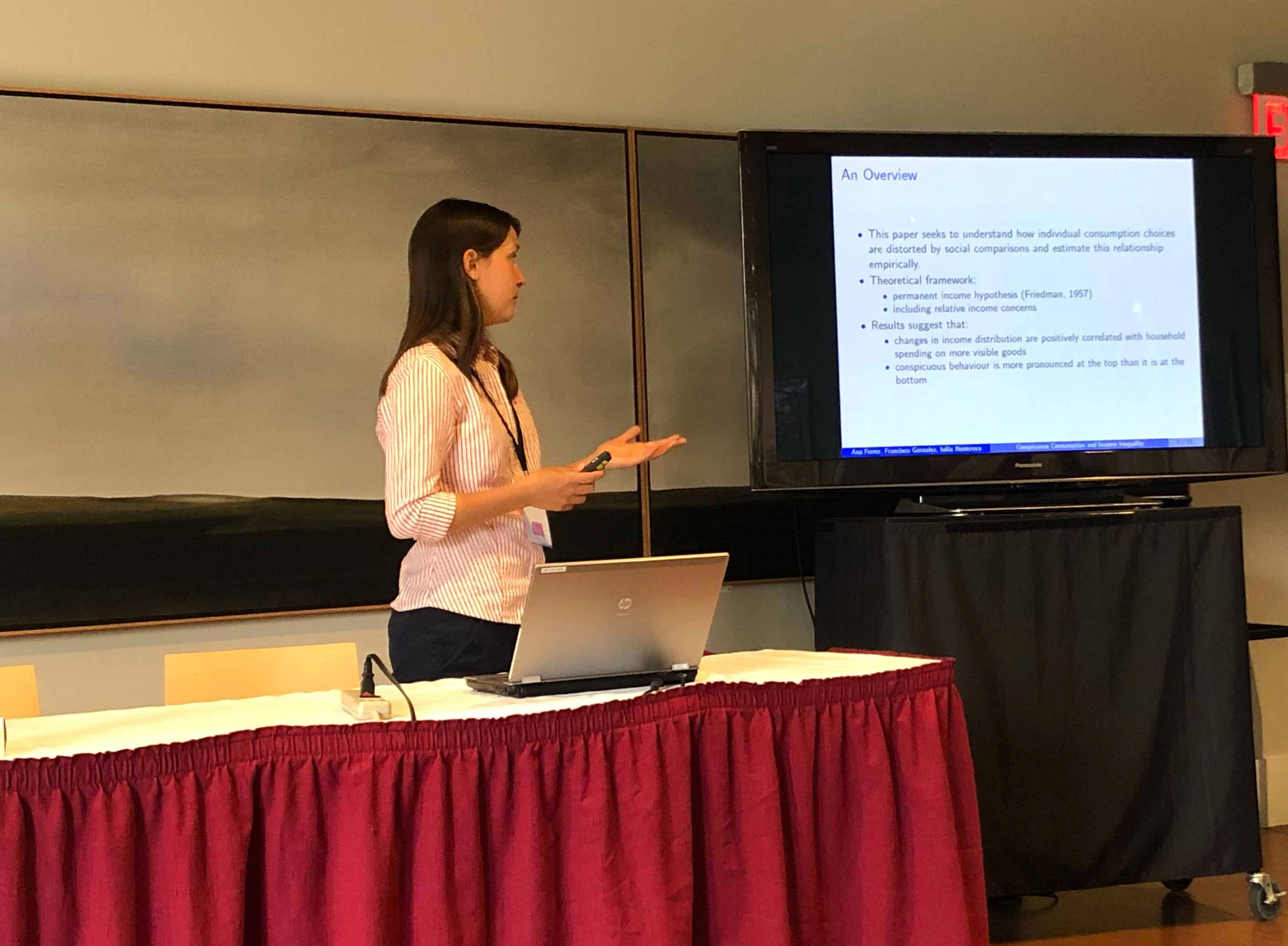
PhD student Iuliia Nesterova presenting her paper on The Link Between Conspicuous Consumption and Income Inequality at the Canadian Economics Association conference. Photo: A.Yu
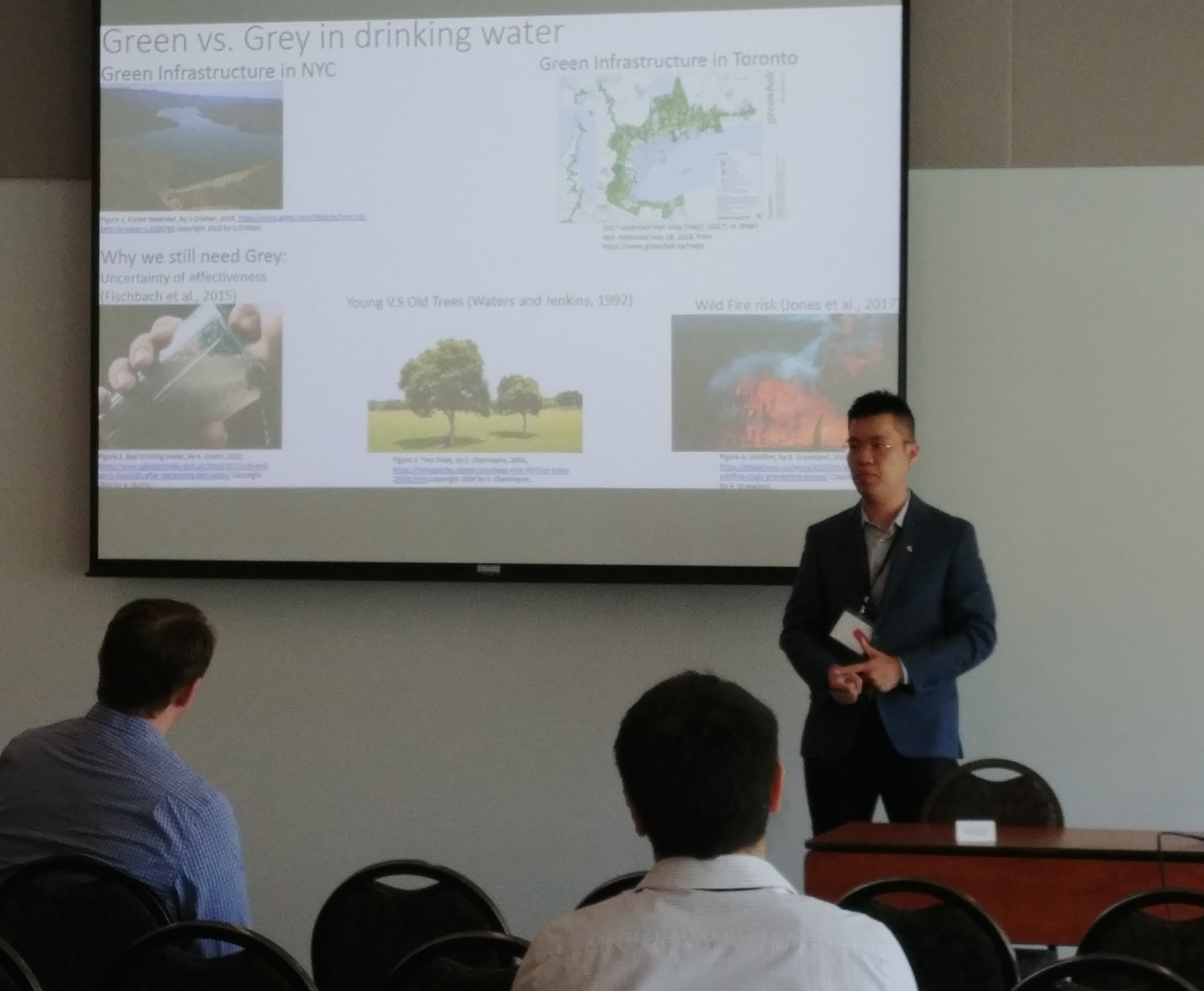
PhD student Zehua Pan presenting his paper A Theoretical Modeling Framework to Support Investment Decisions in Green and Grey Infrastructure under Risk and Uncertainty at the Canadian Economics Association conference. Photo: M. Insley
Humor in Economics
Putting the Fun into Economic Fundamentals
by Barb Bloemhof
It might surprise you to know that the dismal science has a long history of humor. A number of economists from Stigler to the StandUpEconomist.com have used levity to say something about the discipline’s rhetorical approach to the human condition. There’s even an annual concurrent session on humor at the largest international meeting of economists in the world, the Allied Social Sciences Association conference.
Now in its eleventh year, this humor session began the year after Yoram Bauman reprised his parody of N. Greg Mankiw’s Ten Principles of Economics for the economics audience. The first thing to notice about this sketch is its fidelity to the economic way of presenting information. The tradition has always relied on using economics to bring the funny: not self-deprecating; rather, doubling down on the economic way of thinking.
Take an early example, Siegfried’s (1970) “First Lesson in Econometrics,” which emulates mathematical modelling to “simplify” (actually complicate) the expression 1 + 1 = 2. Oxoby’s (2009) experimental paper “On the Efficiency of AC/DC: Bon Scott versus Brian Johnson” uses actual data collected for another project to faithfully analyze a research question he overheard being vigorously (but not rigorously) explored in an airport bar on the way home from a conference. The annual humor session itself, honoring the author of a 1996 anthology of economic humor, is run like a Festschrift and not a standard three comedian lineup.
Ray (1991, 239) argued that humor was a vehicle to elicit reaction, sometimes to controversy, sometimes to critique of the discipline, but this claim does not fit so well any more. Recent examples in economics seem motivated by the observation that humor makes ideas accessible and stimulates thought. Visuals particularly provide comedic effect in Smith’s (2008) paper “Japan’s Phillips Curve Looks Like Japan,” while Figure 2 in Krugman’s (2010) “Theory of Interstellar Trade” necessarily leaves everything to the imagination because it is drawn in Minkowski space-time.
The topic of humor has somehow gone from JEL code Z (Other Special Topics) to Y9 (Miscellaneous Other Other) over the recent past, apparently to clarify how seriously economics takes humor. Adding a bit of fun is just efficient resource use in the dismal science.

This slide, illustrating how the function “horse” relates Mexican GDP to US GDP, very memorably supports the need for experimental control, where conditions can be varied and more data collected. Thanks go to Charlie Plott for providing the slide from his seminar presentation to the McMaster Experimental Economics Laboratory group; and to Rod Kiewiet for confirming that a student had produced it for a political science class.
References
Bauman, Yoram. 2007. Principles of Economics, Translated. Youtube. Last modified 25 February 2007. https://www.youtube.com/watch?v=VVp8UGjECt4
Krugman, Paul. 2010. The Theory of Interstellar Trade. Economic Inquiry 48(4), 1119-1123.
Oxoby, Robert J. 2009. On the Efficiency of AC/DC: Bon Scott versus Brian Johnson. Economic Inquiry 47(3) (July), 598-602.
Ray, Margaret A. 1991. The Lighter Side of the Dismal Science: The Humor of Economics. The Social Science Journal 28(2), 227-242.
Siegfried, John J. 1970. A First Lesson In Econometrics. Journal of Political Economy 78(6), 1378-1379.
Smith, Gregor. 2008. Japan’s Phillips Curve Looks Like Japan. Journal of Money, Credit and Banking 40(6) 1325-1326.
Test your economics knowledge with this crossword puzzle
by Corey Van de Waal

Download and print out the .pdf version here. The first three correctly solved puzzles will receive a cool Economics prize, so don’t forget to fill in your contact details!
(Contest is closed to members of the faculty and staff and their families – sorry!)
Want to Connect?
- The seminar webpage has our schedule of visiting speakers, and everyone is welcome. Please come hear what’s new in economic research.
- Have exciting news to share? We’d love to hear what you are up to!
- Interested in giving a talk? Each year we invite UW Economics Alumni/ae to inspire and inform our students with your experiences. We’d love to welcome you in our classes!
- Want to be involved in networking or economic events? Please just ask!
- Want to contribute to our activities? Your donations help fund awards and lectures that make a difference. We’d love to hear from you – and thank you!
To connect, please email Lutz-Alexander Busch. To donate, please contact Kim Bardwell or donate online.
